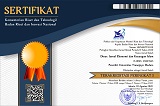Optimization of Productive Waqf Management in Pekanbaru, Indonesia
Abstract
This study aims to identify ways to optimize the management of productive waqf through the collaboration of stakeholders, including government, academics, and the community. This research uses a qualitative descriptive method with data collection through focused group discussion (FGD) and interviews with nazir, wakif, and related agencies. The results showed that the optimization of waqf management requires the active role of all parties to ensure that waqf management runs transparently and productively. Waqf education and literacy through digital media, including the use of Quick Response Code (QR Code), as well as digital payment platforms such as Link Aja Syariah and OVO, are the main strategies in increasing waqf awareness. Nazir is also required to run a transparent program with detailed and measurable reporting of funds. This study recommends increasing nazir capacity, revising regulations related to incentives for waqf managers, and encouraging active participation of academics and the government in the development of more effective productive waqf.
Keywords
Full Text:
PDFReferences
Amarodin, M. (2019). Optimalisasi Pemberdayaan Wakaf produktif di Indonesia (Ikhtisar Strategis dalam Membangun Kesejahteraan Ekonomi Keumatan). Jurnal Eksyar ( Jurnal Ekonomi Syariah ), 06(02), 162 – 177.
Asytuti, R. (2012). Optimalisasi Wakaf Produktif. AT - TARADHI Jurnal Studi Ekonomi, 3(1), 45–54.
Burhan Bungin. (2005). Penelitian Kualitatif, Komunikasi, Ekonomi, Kebihakan Publik, dan Ilmu Sosial Lainnya. jakarta: Kencana Pranada Media Group.
Devi Megawati. (2014). Pengelolaan Dan Pengembangan Wakaf Produktif Di Kota Pekanbaru. Hukum Islam, XIV(1), 104–124.
Fitri, R., & Wilantoro, H. P. (2018). Analisis Prioritas Solusi Permasalahan Pengelolaan Wakaf Produktif (Studi Kasus Kabupaten Banjarnegara). Al-Muzara’ah, 6(1), 41–59. https://doi.org/10.29244/jam.6.1.41-59
Hadyantari, F. A. (2018). Pemberdayaan Wakaf Produktif : Upaya Strategis untuk Kesejahteraan Ekonomi Masyarakat. Jurnal Middle East and Islamic Studies, 5(1), 1–22.
Harahap, M. B. B., & Darwanto, D. (2021). Peran Strategi Badan Wakaf Indonesia (BWI) Dalam Meningkatkan Profesionalisme Nazhir Kota Semarang. TAWAZUN : Journal of Sharia Economic Law, 4(1), 104. https://doi.org/10.21043/tawazun.v4i1.10192
Irwanto. (2006). Focused Group Discussion (1st, April ed.). Yayasan Obor Indonesia.
Kamus Besar Bahasa Indonesia (KBBI) Online. (2023). https://kbbi.web.id/potensi
Kemenag. (2021). Sistem Informasi Wakaf.
Koto, A., & Saputra, W. (2016). Wakaf Produktif Di Negara Sekuler: Kasus Singapura Dan Thailand Alaiddin Koto Dan Wali Saputra. Wakaf Produktif Di Negara Sekuler... Singapura, 13(2), 126–139.
Lubis, H., Rustam, T., Nuryanti, & Kafnaeni, D. S. (2023). Faktor-Faktor yang Mempengaruhi Optimalisasi Pengelolaan Wakaf Produktif pada Badan Wakaf Indonesia di Propinis Riau. AT-TAWASSUTH:Jurnal Ekonomi Islam, VIII(I), 157–173.
Nuryanti, Haniah Lubis, Muhammad Tahir Cheumar, F. M. (2024). Pengelolaan dan Pengembangan Wakaf Uang oleh Lembaga Nazhir di Kota Pekanbaru. Al-Muqayyad, 7(2), 28–39.
RI, D. A. (2005). Undang-Undang Republik Indonesia Nomor 41 Tahun 2004 Tentang Wakaf (ke 2). Direktorat Jenderal Bimas Islam dan Penyelenggaraan Haji.
Sa’adah, N., & Wahyudi, F. (2016). Manajemen Wakaf Produktif : Studi Analisis Pada Baitul Mal Di Kabupaten Kudus. Equilibrium, 4(2), 334–352.
Sugiyono. (2017). Metode Penelitian Kuantitatif, Kualitatif, dan R&D. Bandung: CV. Alfabeta.
Suharto, R. (2021). Good Nadzir Governance. Sekolah Nadzir Wakaf, MES Pekanbaru.
Syaifullah, H., & Idrus, A. (2019). Inovasi Pelayanan Wakaf Produktif Era Digital: Studi Kasus Di Yayasan Wakaf Bani Umar 2018. In ZISWAF : Jurnal Zakat dan Wakaf (Vol. 6, Issue 2). https://doi.org/10.21043/ziswaf.v6i2.6415
Ulfiana, R., & Yulianti, R. . (2019). Optimalisasi Pengelolaan Wakaf Produktif di Majelis Wakaf dan Kehartabendaan Pimpinan Daerah Muhammadiyah Kota Yogyakarta. Jurnal Syarikah, 5(2), 125–132.
Veithzal Rizal Zainal. (2016). Pengelolaan Dan Pengembangan Wakaf Produktif. Ziswaf, 9(1), 1–16.
Yusuf, A. M. (2014). Metode Penelitian Kuantitatif, Kualitatif, dan Penelitian Gabungan. Prenadamedia Group.
DOI: https://doi.org/10.21107/dinar.v12i1.27563
Refbacks
- There are currently no refbacks.
Copyright (c) 2024 Nuryanti Nuryanti, Haniah Lubis

This work is licensed under a Creative Commons Attribution-ShareAlike 4.0 International License.
Journal Dinar Indexed by:
Dinar: Jurnal Ekonomi dan Keuangan Islam by Universitas Trunojoyo Madura is licensed under a Creative Commons Attribution-ShareAlike 4.0 International License.






.png)










